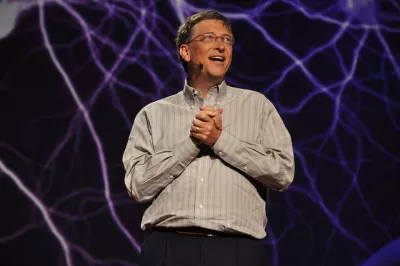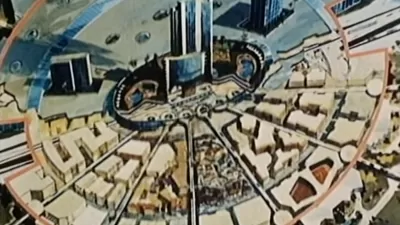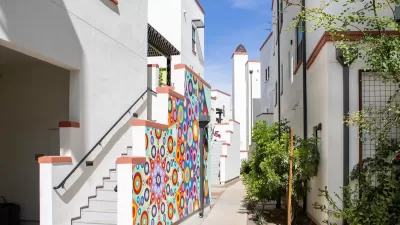The new community of Belmont will join Arcosanti as another attempt at turning Arizona desert into the next evolution of human habitation. This time, one of the richest men in the world is behind the plans.

"An investment firm run by Bill Gates has put down $80 million to develop a planned community in Arizona," reports Sophie Wiener.
The idea is to build a "smart city" on 25,000 acres of land located about 45 minutes west of Phoenix. The new planned community will be called Belmont. "Of the 25,000 acres, 3,800 will be used for office, retail, and commercial space," explains Wiener. "Another 470 acres will be used for public schools. That leaves enough space for 80,000 residential units."
A press release from Belmont Partners, Gates's investment firm, explains more about the ambitions of the development: "Belmont will create a forward-thinking community with a communication and infrastructure spine that embraces cutting-edge technology, designed around high-speed digital networks, data centers, new manufacturing technologies and distribution models, autonomous vehicles and autonomous logistics hubs."
Bianca Buono broke the news about the purchase, and also speaks with Ronald Schott, executive emeritus at the Arizona Technology Council about the prospects for the new development. Schott notes in particular the site's proximity to the proposed I-11 freeway, "which would run right through Belmont and connect to Las Vegas."
Bill Gates is also featured in the news report, shared by KPNX on YouTube shown below, about the plans for Belmont.
FULL STORY: Bill Gates buys huge chunk of land in Arizona to build 'smart city'

Study: Maui’s Plan to Convert Vacation Rentals to Long-Term Housing Could Cause Nearly $1 Billion Economic Loss
The plan would reduce visitor accommodation by 25,% resulting in 1,900 jobs lost.

North Texas Transit Leaders Tout Benefits of TOD for Growing Region
At a summit focused on transit-oriented development, policymakers discussed how North Texas’ expanded light rail system can serve as a tool for economic growth.

Why Should We Subsidize Public Transportation?
Many public transit agencies face financial stress due to rising costs, declining fare revenue, and declining subsidies. Transit advocates must provide a strong business case for increasing public transit funding.

How to Make US Trains Faster
Changes to boarding platforms and a switch to electric trains could improve U.S. passenger rail service without the added cost of high-speed rail.

Columbia’s Revitalized ‘Loop’ Is a Hub for Local Entrepreneurs
A focus on small businesses is helping a commercial corridor in Columbia, Missouri thrive.

Invasive Insect Threatens Minnesota’s Ash Forests
The Emerald Ash Borer is a rapidly spreading invasive pest threatening Minnesota’s ash trees, and homeowners are encouraged to plant diverse replacement species, avoid moving ash firewood, and monitor for signs of infestation.
Urban Design for Planners 1: Software Tools
This six-course series explores essential urban design concepts using open source software and equips planners with the tools they need to participate fully in the urban design process.
Planning for Universal Design
Learn the tools for implementing Universal Design in planning regulations.
Ascent Environmental
Borough of Carlisle
Institute for Housing and Urban Development Studies (IHS)
City of Grandview
Harvard GSD Executive Education
Toledo-Lucas County Plan Commissions
Salt Lake City
NYU Wagner Graduate School of Public Service





























